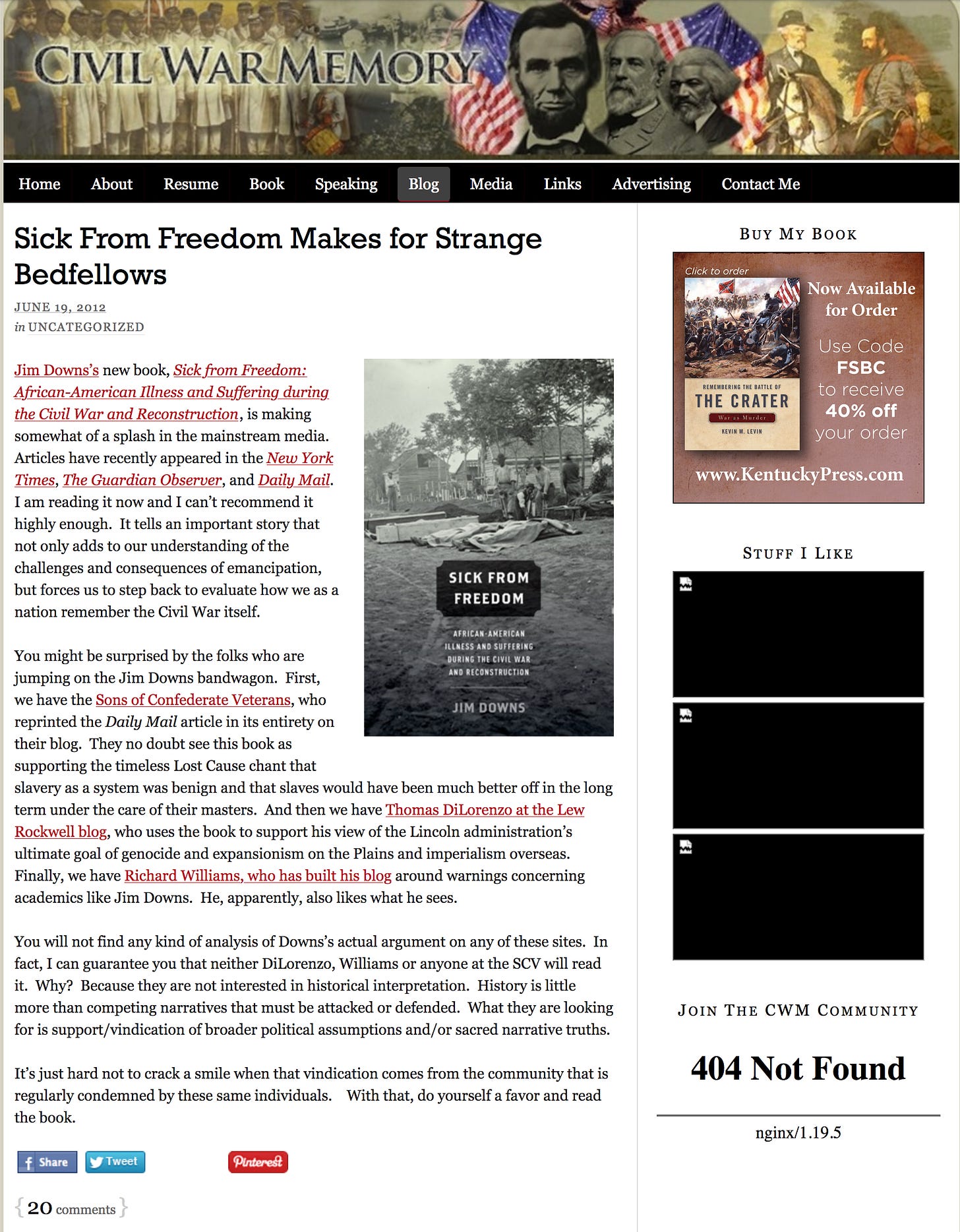It’s not an exaggeration to say that social media made my career as a historian. In 2005 I had completed a masters thesis on William Mahone and the battle of the Crater at the University of Richmond and I was teaching history full time at a private school in Charlottesville.
I was content but was also eager to find ways to continue to share my interest in the Civil War era and historical memory with others.
In November of that year I wrote my first blog post on a site that I called Civil War Memory. I started out on Google’s blogspot before moving to TypePad and finally to WordPress [The WordPress site still includes my archive of posts if interested.]
I didn’t really have any idea what I was doing. Blogging was still relatively new. Over the next few months I wrote about the books that I was reading, offered commentary about relevant news articles, and shared progress on new research projects.
Within a year I had amassed a pretty large readership, but it wasn’t just the numbers that stood out. My readers came from a wide range of backgrounds, including academics, Civil War enthusiasts, neo-Confederates, and teachers. It was fascinating to watch this community interact in the comments sections of my posts. Sure there were flair-ups and I had to ban people from commenting on occasion, but overall it worked.
I absolutely loved connecting with people through my site. It seemed as if I was perfectly positioned to bring this particular group of readers together and I learned a hell of a lot.
What I didn’t anticipate were the invitations to speak as well as opportunities to write for newspapers, magazines, and even academic publications. The connections that I made through Civil War Memory eventually led to a contract to publish my thesis, which was released in 2012.
By far the most exciting time to blog about Civil War memory was during the Civil War sesquicentennial, from 2011 to 2015. There was plenty to write about and much of it revolved around how we remember or if we should commemorate the Confederacy at all—questions that exploded into the public domain after 2015.
Long-time readers of my blog know that my writing tapered off significantly in the period after 2015. It hit a low point in 2020-21 and I even contemplated shutting my blog down permanently. Twitter and other micro-blogging platforms had gained traction. Instead of blog posts I was soon writing lengthy tweet threads. I connected to a whole new group of people and I learned a great deal from my fellow historians.
But as I explained this past summer, my time on Twitter also came with a price. I eventually returned on a limited basis, but those very same issues persist to this day. Now, as the great migration to other platforms continues, I’ve been left with the question of whether to follow.
Right now I have no plans to migrate over to Mastodon, Post, Hive or any other micro-blogging platform. As much as I value the connections I have made with others, it is impossible to chase everyone down over mulitiple sites. This has never been why, as a historian, I use social media.
And to be completely honest, as valuable as Twitter has been, it has also brought out the worst in many of us, myself included. I suspect that these other platforms will encourage similar behavior and right now I want less drama online.
Moving to Substack this past March has recharged my blogging. I’ve probably written more this year than the past few years combined. With Twitter unraveling over the past month, what I’ve realized is that, for me, it’s the content that matters the most. I want the freedom to write as much or as little about a given subject and get it to the people who care the most about reading and responding to it.
I am excited to begin a new chapter here on Substack this week.
Blogging has always been where I feel the most comfortable and the most rewarded. I have all of you to thank for that.
As always, thanks for reading.





Hey Kevin - Thanks for sharing your 'road here and the road ahead'.
Its a mission and goal that I support both philosophically and now - given that I just signed up for a subscription - financially.
If your mission statement resonates with other members of the community as it does for me I'd encourage them to do the same.